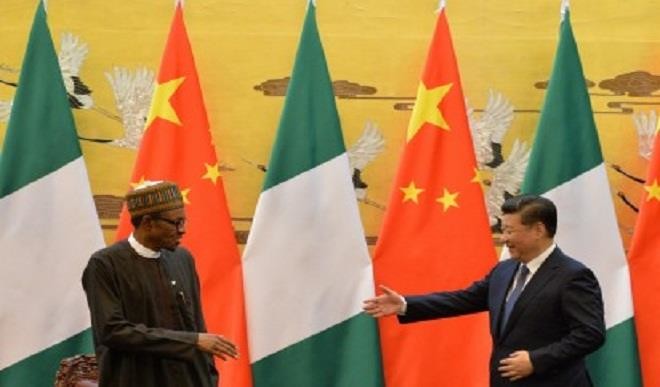Tomorrow Nigeria marks 59th anniversary as a sovereign and independent country. For almost a century Nigeria and Nigerians suffocated under the heels of British imperial rule characterized by domination, brutal oppression, Lugardian military occupations and wholesale exploitation. It is commendable that President Muhamadu Buhari has in recent time raised the noise level of Independence celebrations wrongly stepped down by previous administration as “low key” event. At 60 Nigeria must raise the banner of freedom and independence with high GDP growth rate, poverty alleviation, equity, justice and deepened democracy. Last Thursday, 27th of September, Dr. Zhou Pingjian, Ambassador of China to Nigeria hosted a historic reception to mark the liberation of China from first Western (read: British) and Japanese imperialism. Yours comradely was privileged to be witness to history: China at 70. The founding father of liberated China, – Mao Zedong, led the Communist Party to defeat the Western backed “Nationalists” in a 20 year liberation war. On the 1 October (1949), Mao Zedong, proclaimed the founding of the People’s Republic of China.
I agreed with Ambassador Zhou Pingjian that the “joy” of both Nigeria and China “ is shared and happiness doubled on the occasion of October 1st celebration every year.” Of course China parades ancient civilization dating back to some 5000 years. Also early authentic (as distinct from colonial) history of Nigeria records great Benin Empire, Oyo Empire, Sokoto and Borno empires dating back to some 4000 years. The point cannot be overstated therefore that independence anniversaries of both China and Nigeria underscore sovereignty from domination. Colonialism necessarily influences the growth and development of both countries. China and Nigeria can only be better appreciated against the background of imperial domination of the two. The great historian, Walter Rodney in his classic: ‘How Europe Underdeveloped Africa’ observed (and I agree!) that “Colonialism had only one hand – “It was one-armed bandit!” 59 years after independence, of course we must agonize about the declining fortunes of the economy low as opposed to high growth rate. However we should not forget so soon that in colonial Nigeria, growth discourse was an aberration, an absurdity. The colonial policy was to under-develop Nigerian colony and develop colonial Britain through direct capital transfers which made the present P& ID & 9.6 billion a small scam. Scam is actually a British colonial legacy.
With respect to industrialisation for instance, colonialism deliberately prejudiced against the establishment of industries. The key drivers of colonial Nigeria and indeed colonial Africa, were agriculture and the extractive spheres of mining and timber felling. African industrialisation was deliberately blocked by the colonial governments acting on behalf of the metropolitan industrialists. Pre-colonial West Africa had a range of manufacturing industries like clothing production that involved ginning, carding, spinning, dyeing and weaving which closely resembled those of pre-industrial societies in other parts of the world. However colonial authority deliberately undermined the growth of this local enterprise such that 100 years of British rule did not set up a single textile mill! The first textile mill was Kaduna Textile mill in 1957 by the regional government of late Sardauna to be followed by Nigeria Textile Mill in the Western region of Awolowo and Aba Textile mill in the east by late Namdi Azikwe Zik. The celebration of independence can only be therefore appreciated against the background of de-industrialization of colonial era and industrialization of post-colonial Nigeria. In the area of education, colonial education was designed to produce clerks and other functionaries to service the lower echelons of the colonial system. Colonial education never produced social scientists, engineers, nor Nobel Laurel! Yours truly, agrees that we can’t go on blaming the colonialists eternally for all our problems but I insist that the spectre of colonial underdevelopment still hunts us today. At 59 Nigeria has produced Nobel Laurel, as many as 43 Federal Universities, 48 State Universities, and 79 Private Universities. The British never set up any university, (university College Ibadan was an appendage of metropolitan Uk University of London). Nigeria has trained, thousands of doctors nurses, engineers in the past 69 years. By 1980s Nigeria was marching towards full literacy with universal compulsory basic education and adult literacy campaign. At 59 it’s unacceptable that Nigeria parades new illiteracy with as many as 10 million children out of schools. Nigeria must learn and copy China, which at 70, (just a decade older) as a liberated country has almost banished illiteracy, gone to space, lifted more than 700 million people out of poverty, parades “over the past 70 years, GDP averaged an annual growth rate of about 4.4% for the first three decades and 9.5% for the last four decades.
By 2020, China announces that “all people living below the current poverty line will be taken out of poverty”. At 60 next year Nigeria should be up-beat to say like China: independence has “brought enormous changes to the country, creating an unprecedented miracle of development in the world history”. The Chinese Ambassador aptly puts it better the “path you take determines your future”. China we are gain reminded was once “labeled as the “Sick Man of East Asia”, life expectancy at the beginning of the new republic was around 35 years. It rose to 77 years in 2018. The illiteracy rate in China stood at 80% in 1949, today the newly-added labour force has received over 13.3 years of education on average. The average years of schooling for the Chinese rose to 10.6 years in 2018 from 1.6 years in 1949. In 2019, the gross enrollment ratio in higher education rose to 48.1% from 0.26% in 1949”. At 59 Nigeria and Nigerians should stop agonizing but organize like China at 70, (or like Nigeria at 20 in 1980 with double digit growth rate which once dwarfed China’s growth!). VIVA Nigeria and China!!




